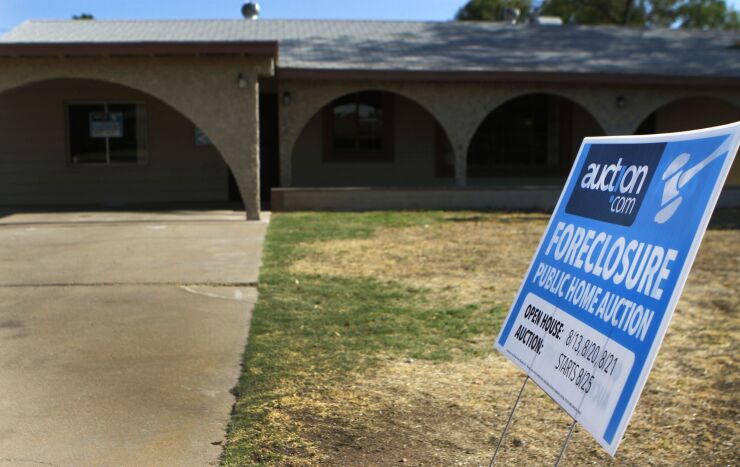By Hannah Lang and Neil Haggerty
WASHINGTON — Responding to concerns about the impact of the coronavirus outbreak on the housing sector, the administration announced steps Wednesday to halt foreclosures on government-backed mortgages.
In a press conference, President Trump said he had directed the Department of Housing and Urban Development to suspend all evictions and foreclosures on HUD-backed properties until the end of April.
Moments later, the Federal Housing Finance Agency said it was directing Fannie Mae and Freddie Mac to suspend all foreclosures and evictions for at least 60 days for homeowners with mortgages backed by the government-sponsored enterprises.
News of the temporary freezes came after the administration had faced increasing pressure from members of Congress and advocates to
“We’re working very closely with [HUD Secretary] Dr. Ben Carson and everybody from HUD,” Trump said.
FHFA Director Mark Calabria said the foreclosure suspension "allows homeowners with an Enterprise-backed mortgage to stay in their homes during this national emergency."
Financial institutions’ legislative agenda was already a low priority in Congress. Lawmakers’ efforts to stabilize the economy have shifted attention even farther away from bills that would benefit the industry.
The Federal Reserve's support for the commercial paper market made clear that it was willing to go beyond cutting interest rates, but the central bank may feel pressure to do even more as the crisis worsens.
Regulators issued a rule that gives banks the OK to dip into capital to help households and businesses cope with the economic impact of the coronavirus.
“As a reminder, borrowers affected by the coronavirus who are having difficulty paying their mortgage, should reach out to their mortgage servicers as soon as possible,” Calabria said in a statement.
FHFA had previously issued guidance urging borrowers affected by the coronavirus to reach out to their servicers about forbearance options. The agency will continue to monitor the situation going forward and “update policies as needed,” FHFA said.
Just this week, over 100 Democrats in the House urged the Trump administration to establish a moratorium on foreclosures and evictions from properties owned or insured by government agencies. Meanwhile, two Senate Democrats have introduced a bill providing a four-month pause in consumers getting penalized on their credit reports for missed payments.
In their letter Tuesday to various agencies, 106 House Democrats called for the foreclosure and eviction freeze on properties backed by Fannie Mae, Freddie Mac, HUD, the Department of Veterans Affairs, and the Department of Agriculture’s Rural Housing Service. They did not specify a duration for the moratorium.
They noted that policymakers instituted similar freezes in previous crises, including Hurricane Maria in 2017.

“Much like a natural disaster, COVID-19 has already caused untold health, social, and economic damage in the United States and across the globe,” the lawmakers wrote. “During this time of uncertainty, it is imperative that your agencies impose a temporary moratorium on foreclosures and evictions to protect the countless Americans who have been, or soon will be, impacted by this evolving public health crisis.”
Separately, Sens. Sherrod Brown, D-Ohio, and Brian Schatz, D-Hawaii, introduced a bill Tuesday to provide an immediate four-month moratorium on all negative credit reporting.
“During these uncertain economic times, Americans shouldn’t have to worry about their credit scores as they work to make ends meet,” said Brown, the top Democrat on the Senate Banking Committee.
The Disaster Protection for All Workers’ Credit Act would also provide free, unlimited credit reports and credit scores for a year from the end of the coronavirus crisis. The bill would also extend protections to consumers’ credit to future crises or disasters.
“Our bill will make sure people who fall behind on their bills won’t take a hit to their credit scores,” said Schatz.








